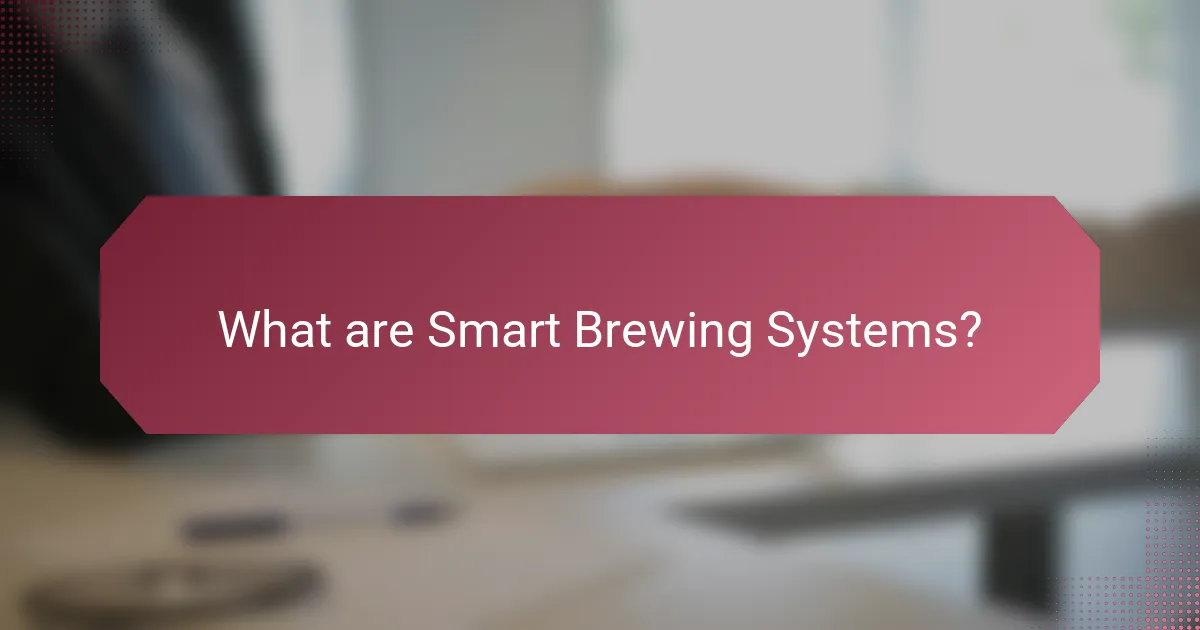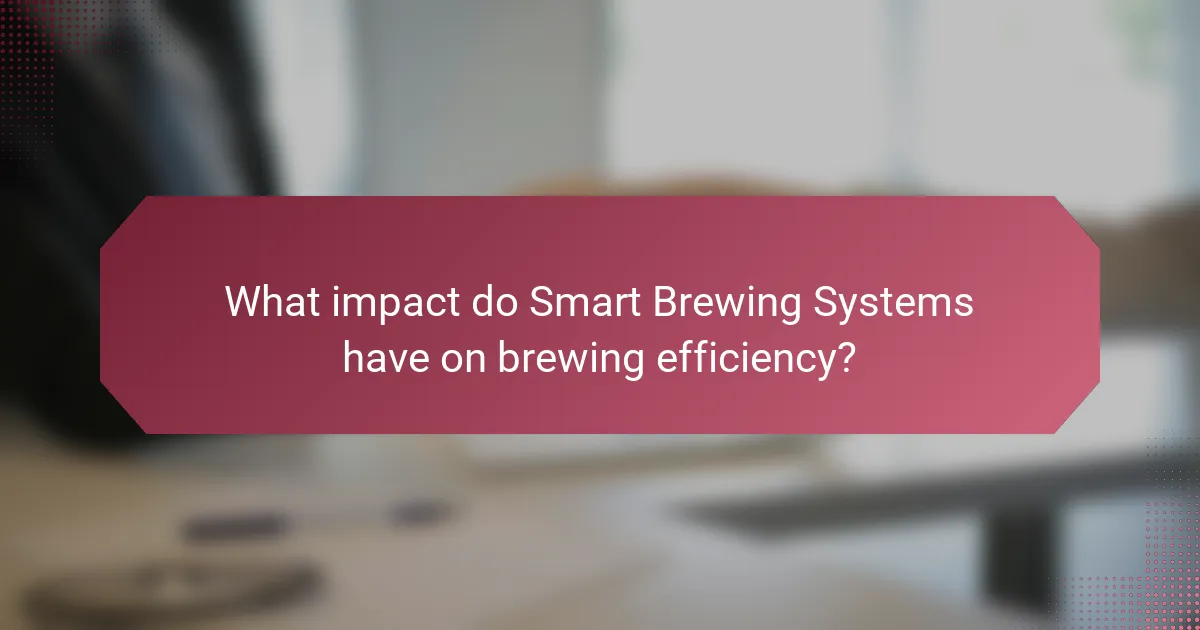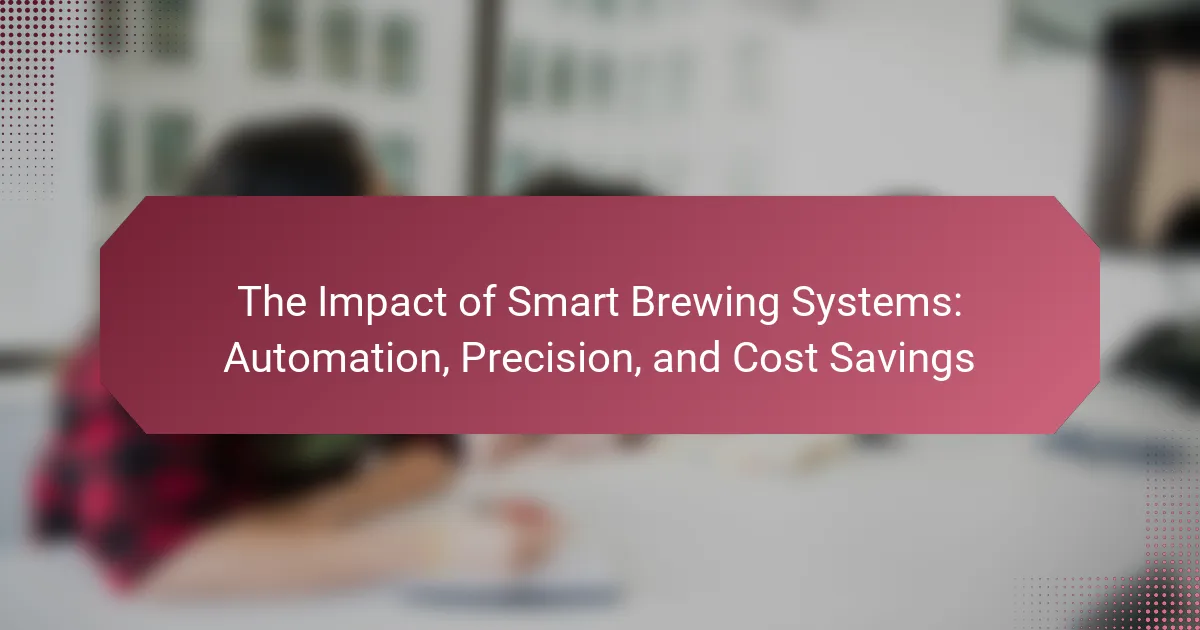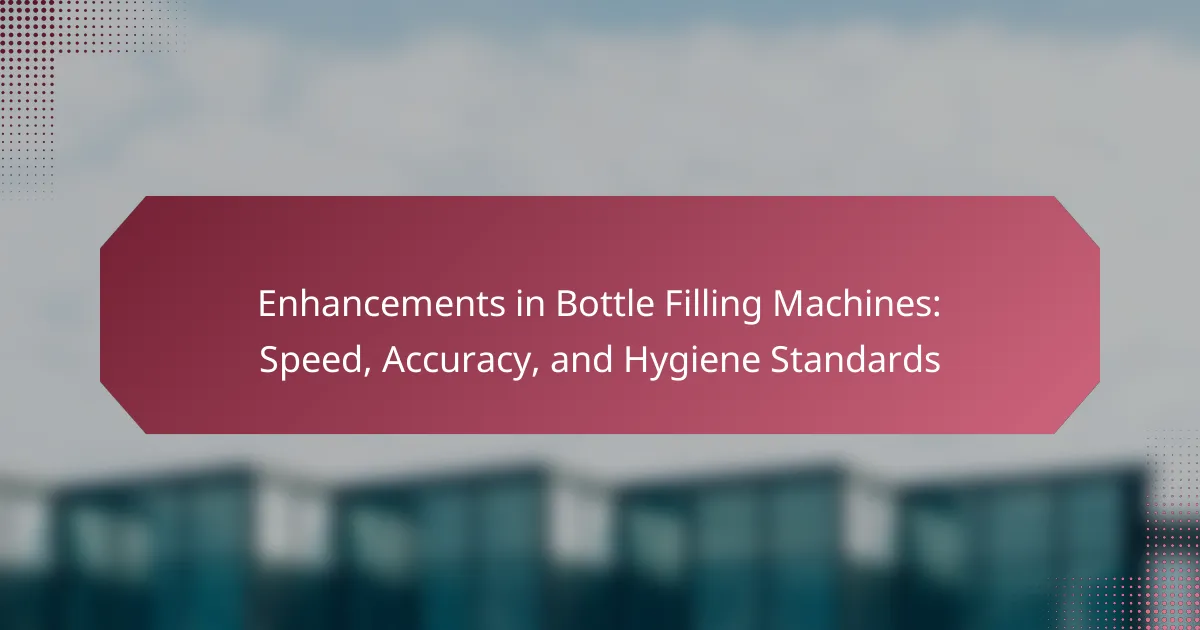Smart Brewing Systems are advanced technologies designed to automate the brewing process, utilizing an integration of sensors, software, and hardware for precise control over brewing parameters. These systems enhance brewing efficiency by reducing manual labor and human error, resulting in consistent product quality and faster production times. By allowing real-time monitoring and adjustments of critical factors like temperature and fermentation, Smart Brewing Systems can increase output by up to 30% and decrease production inconsistencies by up to 30%. Additionally, they optimize energy usage and ingredient costs, potentially saving breweries up to 20% in operational expenses. Overall, the implementation of Smart Brewing Systems significantly improves the quality and consistency of beer production through enhanced automation and data analytics.

What are Smart Brewing Systems?
Smart Brewing Systems are advanced brewing technologies that automate the brewing process. They integrate sensors, software, and hardware for precise control over brewing parameters. These systems allow brewers to monitor and adjust temperature, pressure, and fermentation in real-time. The automation leads to consistent quality and reduced human error. Smart Brewing Systems can also optimize energy usage and ingredient costs. Research indicates that these systems can save up to 20% in operational costs. They enhance the brewing experience by providing data analytics for better decision-making.
How do Smart Brewing Systems function?
Smart brewing systems function through automation and precise control of the brewing process. They utilize sensors to monitor temperature, pressure, and fermentation conditions. These systems often incorporate software for real-time data analysis and adjustments. Automated systems can manage ingredient measurements and timing to ensure consistency. Smart brewing systems may connect to mobile applications for remote monitoring and control. This integration allows brewers to optimize recipes based on data-driven insights. Many systems also feature self-cleaning capabilities for efficiency. The result is improved quality and reduced labor costs in brewing operations.
What technologies are integrated into Smart Brewing Systems?
Smart Brewing Systems integrate various technologies to enhance brewing efficiency. These systems often utilize automation technology for precise control of brewing processes. Sensors monitor temperature, pressure, and pH levels in real-time. Data analytics software analyzes brewing data to optimize recipes and processes. IoT connectivity allows remote monitoring and control via smartphones or computers. Machine learning algorithms improve brewing consistency by learning from past batches. Additionally, automated cleaning systems ensure hygiene and reduce labor costs. These technologies collectively contribute to increased efficiency and cost savings in brewing operations.
How does automation enhance the brewing process?
Automation enhances the brewing process by increasing efficiency and consistency. Automated systems control temperature, timing, and ingredient measurements precisely. This reduces human error and ensures uniformity in each batch. For example, automated brewing systems can maintain optimal fermentation conditions continuously. Studies show that automation can decrease production time by up to 30%. Additionally, it allows for real-time monitoring and adjustments, leading to improved product quality. Overall, automation streamlines operations and enhances the brewing experience.
What are the key features of Smart Brewing Systems?
Smart Brewing Systems offer automation, precision, and cost savings in the brewing process. They feature advanced sensors for real-time monitoring of temperature and pressure. This ensures optimal fermentation conditions. Automated control systems allow brewers to adjust parameters remotely. Smart Brewing Systems also integrate data analytics for recipe optimization. They provide predictive maintenance alerts to prevent equipment failures. Many systems are compatible with mobile applications for user-friendly operation. These features collectively enhance brewing efficiency and product quality.
How does precision play a role in brewing quality?
Precision is crucial in brewing quality as it directly influences the consistency and flavor profile of the final product. Accurate measurements of ingredients, temperatures, and brewing times ensure that each batch meets the desired specifications. For instance, maintaining a precise fermentation temperature can enhance yeast activity and flavor development. Studies show that even small variations in ingredient ratios can lead to significant differences in taste. Furthermore, modern brewing systems utilize automation to achieve high levels of precision, reducing human error. This technological advancement allows brewers to replicate successful batches consistently, improving overall quality.
What are the different types of Smart Brewing Systems available?
There are several types of Smart Brewing Systems available. These systems include all-in-one brewing machines, modular brewing systems, and cloud-connected brewing systems. All-in-one brewing machines combine multiple brewing processes into a single unit. Modular brewing systems allow for customization and scalability based on brewing needs. Cloud-connected brewing systems enable remote monitoring and control via mobile applications. Each type offers unique features that enhance brewing efficiency and precision. The variety in design caters to different brewing preferences and scales of operation.

What impact do Smart Brewing Systems have on brewing efficiency?
Smart Brewing Systems significantly enhance brewing efficiency. They automate various processes, reducing manual labor and human error. This automation leads to consistent product quality and faster production times. Precision in temperature and timing is improved, optimizing fermentation and extraction. Data analytics enable brewers to monitor and adjust parameters in real-time. Research indicates that breweries using smart systems can increase output by up to 30%. Overall, Smart Brewing Systems streamline operations, resulting in higher efficiency and lower costs.
How does automation contribute to cost savings?
Automation contributes to cost savings by increasing efficiency and reducing labor costs. Automated systems streamline processes, minimizing the time required for production. This leads to faster output and less energy consumption per unit produced. Additionally, automation reduces human error, which can lead to costly mistakes. For instance, a study by McKinsey & Company found that automation can reduce operational costs by up to 30%. Furthermore, automated systems require less manual oversight, allowing staff to focus on higher-value tasks. Overall, these factors collectively lead to significant cost reductions in various industries, including brewing.
What are the labor cost implications of using Smart Brewing Systems?
Smart Brewing Systems significantly reduce labor costs in brewing operations. Automation minimizes the need for manual labor in various brewing processes. Operators can manage multiple brewing tasks simultaneously with advanced technology. This efficiency leads to fewer staff requirements. Studies show that breweries using smart systems can cut labor costs by up to 30%. Additionally, reduced labor hours allow for reallocation of staff to higher-value tasks. Overall, Smart Brewing Systems streamline operations and enhance productivity while lowering labor expenses.
How does energy efficiency improve with Smart Brewing Systems?
Smart Brewing Systems enhance energy efficiency by optimizing brewing processes. They utilize sensors and data analytics to monitor energy consumption in real-time. This allows for precise control of temperature and timing during brewing. As a result, less energy is wasted in heating and cooling cycles. Smart systems can also adjust to varying batch sizes, reducing energy use for smaller brews. Studies show that breweries using smart technology can achieve up to a 20% reduction in energy costs. Overall, the integration of smart systems leads to a more sustainable brewing operation.
What are the environmental benefits of Smart Brewing Systems?
Smart Brewing Systems reduce energy consumption and water usage in brewing processes. These systems optimize brewing parameters, leading to less waste. For example, they can decrease water usage by up to 30%. They also minimize energy use by improving efficiency during heating and cooling. Furthermore, Smart Brewing Systems can lower carbon emissions by streamlining production. This results in a smaller environmental footprint for breweries. Additionally, they enable better resource management, promoting sustainability. Overall, these systems contribute to a greener brewing industry.
How do Smart Brewing Systems reduce waste?
Smart Brewing Systems reduce waste by optimizing ingredient usage and minimizing production errors. They utilize precise measurements to ensure accurate ingredient ratios. This precision reduces excess materials that would otherwise be discarded. Automated processes enhance consistency, leading to fewer defective batches. Real-time monitoring allows for immediate adjustments, preventing overproduction. Data analytics identify inefficiencies in the brewing process, enabling continuous improvement. Overall, these systems significantly lower waste and contribute to sustainable brewing practices.
What role do Smart Brewing Systems play in sustainable brewing practices?
Smart Brewing Systems enhance sustainable brewing practices by optimizing resource use. They monitor energy consumption and reduce waste during the brewing process. These systems enable precise control over temperature and fermentation, minimizing energy usage. Research indicates that smart systems can decrease water consumption by up to 30%. They also facilitate the use of renewable energy sources. Additionally, data analytics help identify inefficiencies and improve overall production. This leads to a lower carbon footprint for breweries. Smart Brewing Systems thus significantly contribute to environmental sustainability in brewing.

How do Smart Brewing Systems affect product quality and consistency?
Smart Brewing Systems enhance product quality and consistency through precise control of brewing parameters. These systems automate critical processes such as temperature, timing, and ingredient measurements. This automation reduces human error, which can lead to variability in the final product. Consistent brewing conditions ensure that each batch maintains the desired flavor profile and characteristics.
Research indicates that breweries using smart systems report a decrease in production inconsistencies by up to 30%. These systems also allow for real-time monitoring and adjustments, further ensuring quality. By utilizing data analytics, brewers can identify trends and make informed decisions to improve processes continuously. Overall, smart brewing systems significantly contribute to higher quality and more consistent beer production.
What are the advantages of precise temperature control in brewing?
Precise temperature control in brewing enhances flavor consistency and quality. It allows brewers to extract specific compounds from ingredients at optimal temperatures. This leads to improved aroma and taste profiles. Consistent temperature reduces variability in batches. It also minimizes the risk of off-flavors caused by improper fermentation. Research indicates that maintaining a stable temperature can increase the efficiency of yeast activity. This results in a more predictable fermentation process. Overall, precise temperature control is essential for achieving high-quality brews.
How does ingredient measurement impact flavor profiles?
Ingredient measurement directly impacts flavor profiles by determining the balance of taste components in a brew. Accurate measurements ensure that each ingredient contributes its intended flavor characteristics. For example, too much hops can lead to excessive bitterness, while insufficient malt may result in a lack of sweetness. Precision in measurement facilitates consistency across batches, which is crucial for maintaining flavor integrity. Studies have shown that variations in ingredient quantities can alter the sensory perception of beverages significantly. A report from the American Society of Brewing Chemists highlights that small changes in ingredient ratios can lead to noticeable differences in aroma and taste. Thus, precise ingredient measurement is essential for achieving desired flavor profiles in brewing.
What are the effects of consistency in brewing batches?
Consistency in brewing batches leads to improved flavor profiles and product quality. It ensures that each batch meets the desired taste and aroma standards. Consistent brewing minimizes variations in ingredients, temperature, and brewing time. This uniformity enhances the overall consumer experience. Studies have shown that consumers prefer products with reliable taste and quality. Inconsistent brewing can result in off-flavors and reduced customer satisfaction. Additionally, consistency in brewing processes can streamline production and reduce waste. This efficiency can lower operational costs over time.
How can brewers effectively implement Smart Brewing Systems?
Brewers can effectively implement Smart Brewing Systems by integrating automated technology into their brewing processes. They should start by assessing their current operations and identifying areas for automation. This includes monitoring temperature, pressure, and fermentation levels with sensors. Next, brewers should choose a suitable Smart Brewing System that aligns with their production scale and goals. Training staff on the new technology is essential for smooth operation. Additionally, data analytics can be utilized to optimize recipes and improve product consistency. Implementing these systems can lead to significant cost savings and increased efficiency. Research shows that breweries adopting automation can reduce labor costs by up to 30%.
What best practices should brewers follow when adopting Smart Brewing Systems?
Brewers should prioritize training and integration when adopting Smart Brewing Systems. Understanding the technology is crucial for effective use. Comprehensive training programs ensure staff can operate the systems efficiently. Integration with existing processes enhances workflow and productivity. Regular maintenance is essential for system reliability and longevity. Data analysis should be utilized to optimize brewing processes. Adopting a phased implementation approach allows for gradual adaptation. Collaborating with technology providers can yield valuable insights and support. These practices lead to improved efficiency and cost savings in brewing operations.
What common challenges do brewers face with Smart Brewing Systems?
Brewers face several common challenges with Smart Brewing Systems. One challenge is the initial investment cost. Smart Brewing Systems can be expensive, which may deter smaller breweries. Another challenge is the complexity of the technology. Some brewers may struggle to adapt to advanced automation features. Integration with existing equipment can also pose difficulties. Compatibility issues may arise when connecting new systems to older machinery. Data management is another concern. Brewers must effectively analyze and utilize the data generated by these systems. Finally, reliance on technology can be risky. System failures or software glitches can disrupt brewing processes. These challenges highlight the need for proper training and support.
Smart Brewing Systems are advanced technologies that automate the brewing process, enhancing efficiency, precision, and cost savings. These systems utilize sensors and data analytics to monitor and control brewing parameters such as temperature, pressure, and fermentation in real-time, significantly reducing human error and ensuring consistent product quality. The article explores the functionality, key features, and various types of Smart Brewing Systems, as well as their impact on operational costs, energy efficiency, and sustainability in brewing practices. Additionally, it addresses the challenges brewers may face when implementing these systems and best practices for successful integration.



